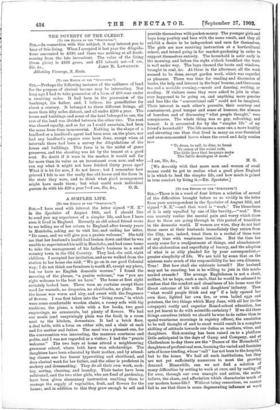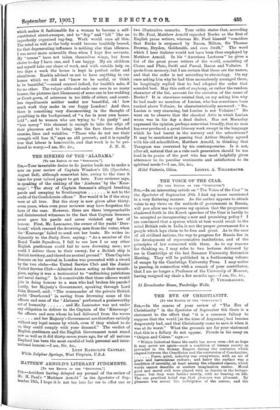(To THE EDITOR OF THE "SPEOTATOR.1 SIR, —There is in a
word of four letters a solution of several of the difficulties brought before us so vividly in the letter from your correspondent in the Spectator of August 16th, and signed " N. Z,"—and that word is " work." The blessedness of it is only equalled by one of like brevity,—" rest." Men can scarcely realise the mental pain and worry which those dear to them are going through in this period of transition in the domestic world. If women are wise, they do not hurl these cares at their husbands immediately they return from the City, nor, indeed, treat them to a recital of these woes at any time with wearisome iteration. But the time has surely come for a readjustment of things, and abandonment of the elaboration and superfluity of luxury, and the adoption of what is so ably pleaded for by your correspondent,— greater simplicity of life. We are told by some that on the mistress rests much of the responsibility for her own dilemma. True ! But how shall she extricate herself P Her husband may not be exacting, but is he willing to join in this much- needed crusade P The average Englishman is not a churl, neither, let us hope, such a snob, that he would be ashamed to confess that the comfort and cleanliness of his home were the direct outcome of his wife and daughters' industry. Then " what would people think and say " if a. lady opened her own door, lighted her own fire, or even boiled eggs and potatoes, the two things which Mary Jane, with all her (to the ratepayer) costly and superior Board-school education, has not yet learnt to do with scientific certainty P If we did these things ourselves (which we should be wise to do rather than to spend wearisome mornings in registry offices), the emulation to be well thought of and to excel would result in a complete shifting of attitude towards our duties as mothers, wives, and daughters. Sick-nursing has been raised on to a platform little anticipated in the days of Gamp and Company, and at Cheltenham to-day there are the "Dames of the Household," daughters of professional men, learning the varied and feminine arts of home-tending, whose "call " has not been to the hospital, but to the home. We hail all such institutions, but they are not yet sufficiently numerous to meet the growing demand. Meanwhile, can we not find a solution of many difficulties by setting to work at once, and by casting off for ever, through our• own example and action, the make- believe, the sham, and affectation which characterise much of our modern home-life P Without being censorious, we cannot fail to see that there is some degenerating influence at work
which makes it fashionable for a woman to become a self- constituted street-sweeper, and to " flop " and " loll " like an imperfectly organised rag-bag. Work would cure all this. The mind as well as the body would become healthily braced, for that degenerating influence is nothing else than idleness. I was never more miserable than when I kept five servants. My "means" have not taken themselves wings, but from choice to-day I have one, and I am happy. My six children and myself take our share of work, and with outside help on two days a week the house is kept in perfect order and cleanliness. Ruskin advised us not to have anything in our homes which we did not "know to be useful, or think to be beautiful,"—sound counsel indeed, for health's sake, if for no other. The vulgar odds-and-ends one sees in so many houses, the pictures (not likenesses) of some one in her wedding or Court gown, of actresses in too little of either, and count- less impedimenta neither useful nor beautiful, oh ! how much work they make in our foggy London ! And then there is something very disconcerting in the thought of grumbling in the background, of " a foe in your own house- hold" ; and to women who are trying to " do justly " and "love mercy " this element is enough to take the edge off their pleasures and to bring into the face those dreaded enemies, lines and wrinkles. " Those who do not use their strength will lose it," says an old proverb; and it is equally true that labour is honourable, and that work is to be pre- ferred to worry.—I am, Sir, &c., J. N. B.











































 Previous page
Previous page